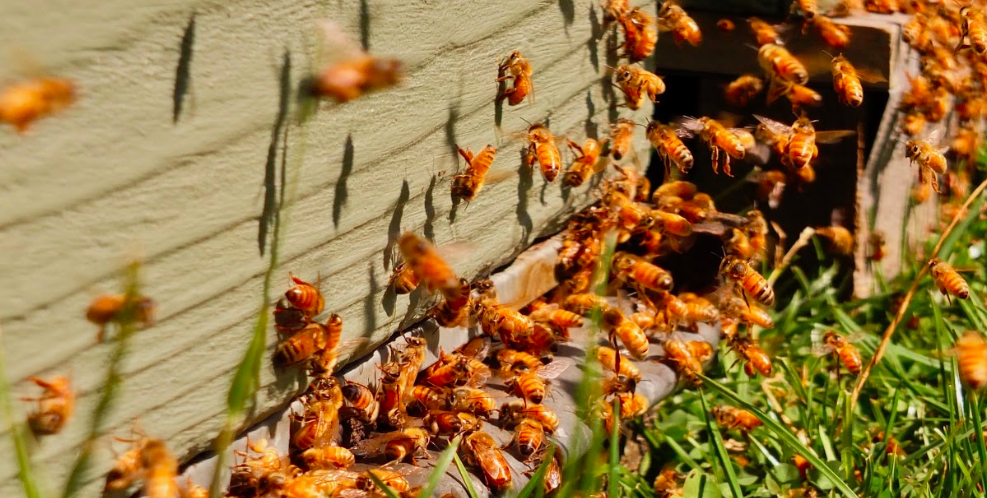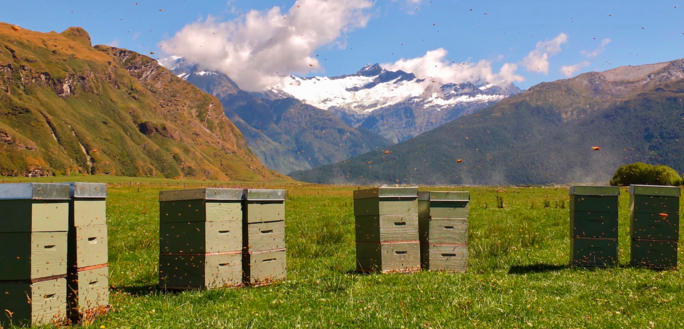The honey business
Diana Cocks
08 June 2019, 8:38 PM
 Peter Ward
Peter WardClover and other delicate honeys such as blue borage (also known as Vipers Bugloss) are the mainstream honeys produced in the Upper Clutha region, while the West Coast is known for its bush honeys, rata, kamahi and manuka. Alpine Honey Specialities produces all these honey types under the guidance of its director Peter Ward at its factory on Domain Road, Hawea.
Like his father and great uncles before him, Peter has been a beekeeper for decades and, with his sons in the industry too, beekeeping is destined to be an intrinsic part of his family for decades to come.
With the long hours of the summer season now behind him, Peter patiently shared a tiny portion of his vast knowledge as an apiarist, revealing an industry experiencing extreme highs and lows, challenges and rewards.
Ten years ago New Zealand’s bee population was substantially affected by the unchecked arrival of the varroa mite which killed the feral bee populations and would have decimated the commercial hives too if beekeepers hadn’t taken stringent action to treat their hives, Peter said.
In Central Otago the wild bees had been pollinating a lot of the orchards and it wasn’t until the wild hives died and fruit production fell dramatically that orchardists realised they needed bees - “and that was a very dramatic change in the industry leading to beekeepers developing the commercial pollination aspects to our businesses”, Peter said.

Bees are essential to crop growers, from carrot seed producers to high country farmers feeding their stock.
“Over half our food is pollinated by bees and if the beekeepers didn’t keep their hives healthy and treat them for varroa, within six months every hive would be dead. That means most of our fruits, nuts and vegetables would be unavailable.”
The Upper Clutha has around eight licensed commercial beekeeping businesses employing more than 50 beekeepers.
Alpine Honey, established in Hawea by Peter’s dad 60 years ago, operates over a vast territory which stretches hundreds of thousands of hectares across Otago, Northern Southland and the West Coast. The company has more than 5000 hives which are relocated at least twice every season to ensure a good spread of pollination.
An average pollination fee (paid to the beekeeper by the landowner for the pollination services) of a single beehive is around $250 and multiple hives will be placed in each crop for three-four weeks at a time over the spring.
“You could spend millions of dollars developing a cherry orchard but have no cherries without bees,” Peter said.
He employs eight to 10 staff all year round but increases that number to 20 during the weeks of the summer season when honey is produced. Ninety-five per cent of the honey produced is exported to the UK, China, Japan and Singapore with only a tiny portion released “to satisfy local demand”.

Beekeeping has many rewards, including working in some of the most beautiful environments.
The industry has survived the varroa mite’s invasion only to now be facing another challenge - the crippling uncertainty of free market forces. An oversupply of honey, brought about by a rapid swell of newcomers to the industry over the past five years looking for a quick buck from the soaring prices of manuka honey, has brought the price plummeting from a high of $14/kg to just $4/kg in the space of 12 months.
The average level of experience amongst beekeepers is now only four years (with many having only one or two years’ experience), Peter said.
“There’s blood on the floor, it’s terrible. A lot of the new operators who have never had to operate with such low returns don’t even know how to keep bees at this price point,” he said. “It’s a desperate situation that a lot of them are facing.”
“There’s a huge amount of uncertainty and a lot of people looking to exit the industry which means there are a large number of hives, especially in the North Island, which have been abandoned. It’s terrible for the bees but also bad for the industry because as soon as someone stops treating the hive then the spread of disease can take off and it could become a huge problem.”
The honey industry is likely to go through a number of seasons of pain while the oversupply situation is rectified, he said. “That’s going to be quite a difficult period, but we’ve been beekeeping in the Upper Clutha basin for over 60 years and we plan to be here for another 60.”
“My two sons now work for me so the business is in its fourth generation. They love it and it affords a really good lifestyle.”
“The hours are fairly long and hard through most of the year, with a lot of night work (hives are moved at night) but you can earn 12 months wages in 10 months.”
It’s during those two quiet months that he and his wife Dawn get away for a few weeks “exploring”. As lovers of the outdoors, Peter and Dawn like to spend time skiing, hiking and biking. Most recently they have enjoyed overseas travel, particularly to Eastern Europe, biking down the Danube Rivers, or hiking in Norway.
It is to the bees he returns, however. Beekeepers must have a real affinity with nature and the ability to read the seasons, Peter said. Every beehive has it own personality and its own set of characteristics and the best beekeepers learn to read what’s happening.
“It’s like a coach looking to get the best out of each player,” he said.
“The thing with beekeeping is that its a very dynamic and evolving industry so there’s always new challenges and new technologies to roll out, and every year is hugely different. So I never get tired of it. Every year just throws up a whole bunch of new challenges and you’re always looking at ways of evolving and improving your practices to make best use of the area and climate and opportunities provided by different crops. So it doesn’t ever get dull or boring.
And that is largely what has kept him going over the decades. Recently, with his sons on board, he has been thinking about reducing his long hours. “I’m trying to wriggle my way out, looking towards easing my way back and letting the boys and other staff take on more.”
Peter certainly won’t miss getting stung every single day, he said. On a bad day it can be 100 stings, but most days will be only half a dozen. “It comes with the territory and you get to the point when it just doesn’t bother you.”
“It’s character building,” he said with a wry grin.
PHOTOS: Supplied

